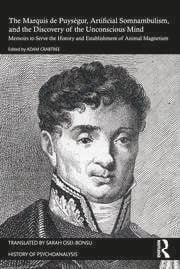The Marquis de Puységur, Artificial Somnambulism, and the Discovery of the Unconscious Mind: Memoirs to Serve the History and Establishment of Animal Magnetism

Book Details
- Publisher : Routledge
- Published : 2024
- Cover : Paperback
- Pages : 138
- Category :
Psychoanalysis - Catalogue No : 97768
- ISBN 13 : 9781032292465
- ISBN 10 : 1032292466
Reviews and Endorsements
The turn of modern psychiatry toward reductive biology, with its emphasis on medical models of mental illness and pharmacological intervention as the treatment method of choice, has itself yielded only modest success so far, and in the process has had the unfortunate side-effect of largely eclipsing the important earlier tradition of dynamic psychiatry so ably reconstructed and championed by Henri Ellenberger in his monumental 1970 work on the discovery of the unconscious. Adam Crabtree has previously reinforced Ellenberger’s efforts in numerous ways, and this new translation by himself and Sarah Osei-Bansu of the Marquis de Puységur’s historically important 1784 memoir on “artificial somnambulism” finally makes available to the wider English-speaking world dramatic early examples of dynamic psychiatry’s theoretically central phenomenon—the existence in ordinary persons of normally hidden but fully conscious secondary personalities exhibiting psychophysical capacities far beyond those of the everyday or primary personality. The preface by Onno Van der Hart and an historical introduction by Adam Crabtree add further value by situating de Puységur’s work in its larger scientific and cultural contexts. Highly recommended!
Edward F. Kelly, PhD, Department of Psychiatry and Neurobehavioral Sciences, University of Virginia School of Medicine, USA
I consider Puységur’s (1784) Memoirs to be the fons et origo of hypnosis. This monograph documents Puységur’s ‘discovery’ of the “tranquil crisis” (i.e., artificial somnambulism) which occurred unexpectedly when he magnetized his servant, Victor. Although he was a forceful proponent of Mesmer’s theory of animal magnetism, Puységur’s practice and his understanding of magnetic crises were decisively shaped by Victor’s idiosyncrasies; for example, Victor insisted that the magnetic crisis gave him an ability to diagnose, prescribe, and predict the course of illness for himself and for other patients). Victor’s peculiarities underpin some classic, hypnotic phenomena – the hypnotic state itself, rapport, clairvoyance, spontaneous posthypnotic amnesia, magnetic illnesses, and Janet’s puzzling insistence that successful hypnotic treatment renders a patient insusceptible to hypnosis.
Paul Dell, Ph.D, Churchland Psychological Center

